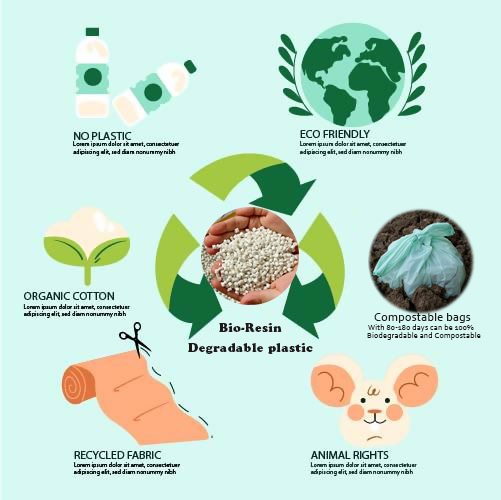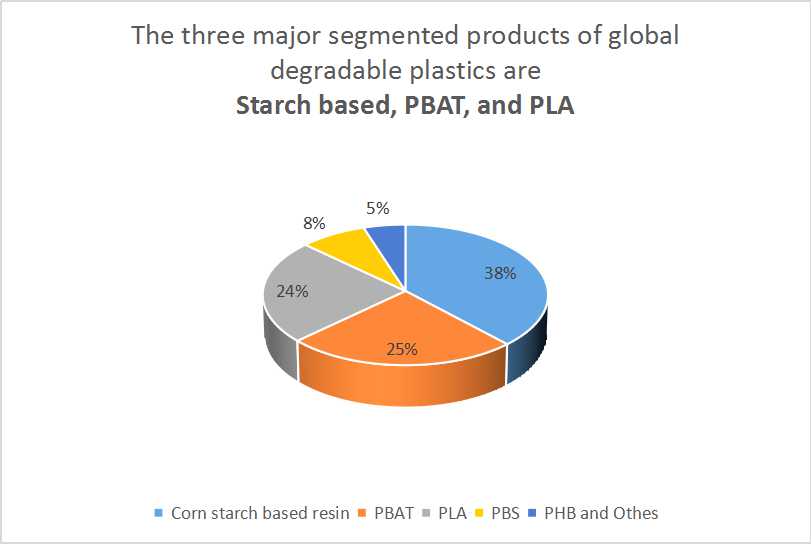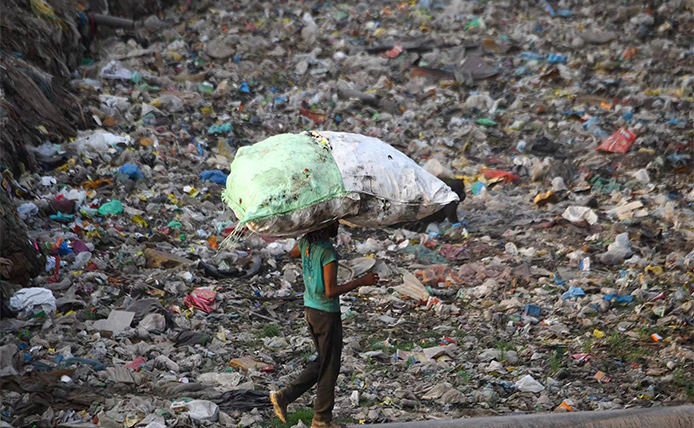
Degradable plastics, also known as environmentally degradable plastics, refer to a class of plastics whose properties can meet the use requirements, remain unchanged during the storage period, and can be degraded into environmentally friendly substances under natural environmental conditions after use. Their main applications include agricultural land films, various plastic packaging bags, Bin bag, shopping bags in shopping malls, disposable catering utensils, etc. With the gradual enhancement of environmental protection awareness, the demand for biodegradable plastics in the market continues to expand, and the industry has great prospects for development.

At present, traditional starch based partially degradable plastics still account for 38% of the global application of degradable plastics. Due to historical reasons, starch based plastics are still the largest variety. PLA and PBAT respectively account for 25% and 24% of the global market, accounting for the majority of the market for fully biodegradable plastics. PBS accounts for 8% of the market share, but due to its weak overall commercial appeal, there are currently fewer manufacturers developing PBS than PLA and PBAT.
PBAT, as one of the three major sub products of degradable plastics, mainly serves as the main body of membrane materials due to its performance, and its production technology has now matured. Compared to global PBAT production capacity, Chinese enterprises with global PBAT production capacity. PBAT has good ductility, elongation at break, heat resistance, and impact resistance, as well as excellent biodegradability, making it the main body of membrane materials; Widely used in plastic packaging film, agricultural film and other film materials.
There are three esterification methods for the preparation of PBAT: co esterification, partial esterification, and series esterification. At present, the earliest and most mature PBAT production process is developed by BASF, Germany. BASF's PBAT trade name is ecoflex; Novamont is one of the earliest companies in the world to industrialize biodegradable plastics, and Novamont's PBAT trade name is Origin Bi. The annual production capacity of PBAT in Lanshantunhe, Xinjiang, China is 120000 tons, surpassing global leaders Novamont in Italy and BASF in Germany.
In recent years, developed countries and regions such as Europe, the United States, and Japan have successively formulated and introduced relevant regulations, limiting the use of non degradable plastics through measures such as partial prohibition, restriction, mandatory collection, and collection of pollution taxes, vigorously developing fully biodegradable new materials to protect the environment and soil. From 2019 to 2020, multiple countries in the Asian region also issued plastic restriction policies, including China, Pakistan, India, the Philippines, Thailand, Algeria, and other countries. In the future, the demand for biodegradable plastics in the Asian region will rapidly increase.

From the actual situation in India, since entering the 21st century, with the economic takeoff, the plastic industry in India has shown a vigorous development trend. At the same time, however, the problem of Plastic pollution in India is becoming more and more serious. It is urgent to promote the plastic industry to speed up the completion of technological upgrading. In addition, more biodegradable materials need to be used to make plastic products, which also drives the development momentum of the domestic degradable plastic market.
According to the Research Report on the Market Status of Indian Degradable Plastics Industry in 2021 and the Feasibility of Overseas Enterprises' Entry, issued by the New ThinkWorld Industry Research Center, in order to alleviate the increasingly serious Plastic pollution problem in China, India has also implemented the plastic ban nationwide in addition to constantly improving the methods of degradable plastics and developing alternative products. In 2018, the Indian government launched a publicity exhibition with the theme of "plastic war quick decision", aiming to appeal to the whole society to work together to fight against Plastic pollution. In response to the call, the Indian government of Haryana also announced that the use of disposable water cups in all government departments in the state was prohibited; The government of Tamil Nadu has announced that the production, sale, storage and use of disposable plastics will be completely prohibited from January 1, 2019. Under the strong promotion of the government, Indian people have also started to minimize the use of plastic products, greatly stimulating the consumption demand of the degradable plastic market.
Future mainstream products of biodegradable plastics.
As an effective way to solve the problem of disposable plastic waste pollution, the global degradable plastic market has developed rapidly. Biodegradable plastics will be the mainstream products of biodegradable plastics in the future, and there is still great room for future market demand. The problem of Plastic pollution in India is becoming more and more serious. It is urgent to promote the plastic industry to speed up the completion of technical upgrading. The development prospect of degradable plastic industry is promising.
